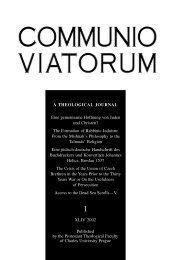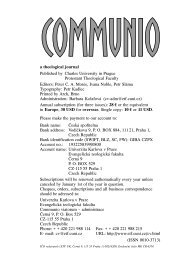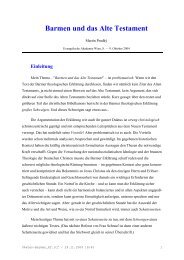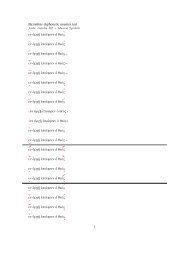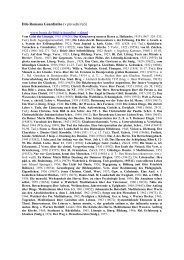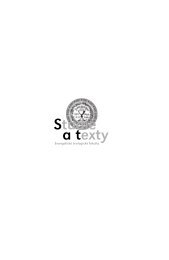A THEOLOGICAL JOURNAL XLIV 2002 Published by the Protestant ...
A THEOLOGICAL JOURNAL XLIV 2002 Published by the Protestant ...
A THEOLOGICAL JOURNAL XLIV 2002 Published by the Protestant ...
Create successful ePaper yourself
Turn your PDF publications into a flip-book with our unique Google optimized e-Paper software.
TONY CARROLL SJ<br />
from <strong>the</strong> analytical tradition of philosophy as developed <strong>by</strong> Austin and<br />
Searle and considers normal language to be based on <strong>the</strong> solving of<br />
problems and coordination of actions within <strong>the</strong> world. Habermas uses<br />
this model of language himself in his own social <strong>the</strong>ory. This model<br />
assumes language to be like a tool with a particular function to perform.<br />
Thus in moving from a <strong>the</strong>ological language to a secular language<br />
all that is happening is that <strong>the</strong> same actions and problems are<br />
being coordinated and solved <strong>by</strong> a better and more efficient language<br />
use. In this sense language is seen as a neutral carrier of <strong>the</strong> information<br />
we need to negotiate our way around <strong>the</strong> world. The use of secular<br />
language in <strong>the</strong> place of religious language would <strong>the</strong>n simply be a<br />
strategic choice in order to achieve influence in <strong>the</strong> public sphere<br />
which would not necessarily affect <strong>the</strong> religious tradition in any negative<br />
way. However, when one considers language from <strong>the</strong> o<strong>the</strong>r major<br />
tradition, that is, <strong>the</strong> tradition developed <strong>by</strong> <strong>the</strong> later Heidegger and<br />
presently championed <strong>by</strong> Derrida, <strong>the</strong> ëworld-disclosing modelí <strong>the</strong>n<br />
not only is language never properly speaking ënormal languageí, since<br />
it is always a fictive construction, 32 but it carries with it a worldview.<br />
Thus to translate from one language to ano<strong>the</strong>r in this model of ëworlddisclosingí<br />
language use would in effect be to change ones basic view<br />
of <strong>the</strong> world. Translation from religious to secular language would<br />
thus be a way of draining <strong>the</strong> content of ones own tradition and accepting<br />
<strong>the</strong> secular world view. Secularisation thus understood would<br />
result in <strong>the</strong> erosion and eventual elimination of <strong>the</strong> religious tradition<br />
as <strong>the</strong> language of <strong>the</strong> secular worldview was accepted. It is clear that<br />
Habermas uses <strong>the</strong> necessity of translating as a form of domestication<br />
of <strong>the</strong> potential violent tendencies in religion which are not prepared<br />
to submit <strong>the</strong>mselves to <strong>the</strong> rules of democratic debate. However, <strong>the</strong><br />
question is, in submitting to <strong>the</strong> secular rules of democratic exchange<br />
does one end up ëselling ones own very soulí? 33<br />
32 See Jacques Derrida, Marges de la Philosophie, Paris, Les Editions de Minuit,<br />
1972, pp. 367ñ393.<br />
33 An interesting point raised <strong>by</strong> Peter Berger would seem to suggest that one does<br />
indeed end up ëselling ones soulí. He notes, in his recent study, that <strong>the</strong> religious<br />
institutions which have adopted adaptation strategies to modern secular culture have<br />
tended to die out, whilst religious movements which tend, on <strong>the</strong> contrary, to be<br />
steeped in various forms of supernaturalism tend to be thriving. See Peter Berger, op<br />
cit., p. 4.<br />
264



